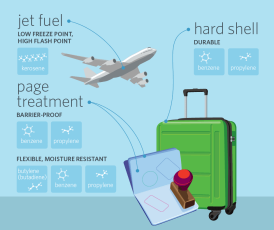Time for a revisit: What happens with refinery profits… and are “buy backs” a bad thing?
Publicly owned companies, like many U.S. refineries, have a fiduciary responsibility (which is a legal obligation) to act in the best interest of their shareholders, and that extends to how companies spend their earnings. Often, earnings are spent on a combination of the following: direct dividends, stock buy back programs, paying down debt and capital investment projects.
AFPM welcomes Aaron Ringel as Vice President of Government Relations
American Fuel & Petrochemical Manufacturers (AFPM) President & CEO Chet Thompson today issued the following statement on the recent hiring of Aaron Ringel as Vice President of Government Relations: “We are glad to welcome Aaron and immediately put him to work on behalf of AFPM’s members from the refining, petrochemical and midstream energy industries..."
AFPM to House Transportation & Infrastructure Committee: Don’t forget freight rail customers
AFPM President and CEO Chet Thompson this week submitted comments to leaders of the House Transportation & Infrastructure Committee after the Committee’s inaugural hearing on the state of U.S. transportation infrastructure and supply chains failed to include customer perspectives.
Mechanical vs. advanced recycling — what’s the difference?
Moving the needle on plastic waste is no small feat, but petrochemical manufacturers are revolutionizing what’s possible. Advanced recycling utilizes advanced processes that break plastic waste all the way down to its original chemical components - expanding the types of plastics that can be recycled, and creating a higher-quality feedstock.
AFPM: Parts of EPA’s RFS proposal “completely contrary” to Congress’s vision
AFPM Senior Director of Fuels and Vehicle Policy, Patrick Kelly, testified during the Environmental Protection Agency’s (EPA’s) public hearing on the proposed Renewable Fuel Standard (RFS) “Set” Rule. EPA’s proposal will stifle advanced biofuels, promote first generation biofuels beyond the market’s ability to absorb them and shift overall RFS growth away from liquid biofuels and into the power electricity sector. This is completely contrary to how congress envisioned EPA’s handling of the program.
AFPM Rail Strike Resolution Statement
Rob Benedict, AFPM’s Vice President of Midstream and Petrochemicals, issued the following statement after Congress passed, and President Biden signed, a resolution to avoid a nationwide rail strike.
Refiners respond to EPA’s RFS proposal covering ethanol & EV charging
AFPM's Geoff Moody issued the following statement responding to the EPA's 2023-2025 proposal for RFS blending obligations: “Congress provided EPA the ability to modernize the RFS and set it on a more sustainable course for all stakeholders. Sadly, EPA’s proposal is a missed opportunity..."
Petrochemicals make world travel possible
Not only do the fuel and petrochemical industries make it possible, they’re also responsible for preserving and maintaining some of the best-known landmarks all over the world. Read on to join us for a ‘round the globe trip to some of the world’s most famous petrochemicals!
Refiners and Petrochemical Manufacturers Urge Immediate Congressional Intervention to Avert Rail Strike, Potential Fuel Shortages
On Tuesday, November 29th AFPM President and CEO Chet Thompson sent a letter to Congressional leadership urging their immediate intervention to avoid a rail worker strike. Thompson stressed that time is of the essence since shipping embargos and service curtailments capable of disrupting U.S. manufacturing, fuel production and freight deliveries are starting now, well before a December 9 work stoppage. A copy of AFPM’s letter is available here and excerpts can be found below:









